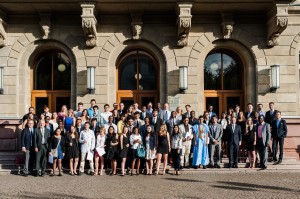Student Reflects on Restorative Justice Program at Green Bay Prison
Student Jillian Dickson-Igl has put together these thoughtful reflections about her experience with the restorative justice program at the Green Bay Correctional Institution.
Back in October, I was fortunate enough to be able to go to the Green Bay Correctional Institution (GBCI) as a part of the Restorative Justice class that was taught by Professors O’Hear and Schneider. The trip consisted of three days at the prison, two of which I was able to attend, as part of the prison’s Challenges and Possibilities program for inmates. The Challenges and Possibilities program is a thirteen-week program that helps the participants focus on their own personal growth as well as aiding them in realizing the impact of their actions, past and present, on other individuals. At the conclusion of the program is when the three-day restorative justice component comes into play, and this is when community members, lawyers, judges, and survivors of crime come to the prison to spend time with the men in the program.
Going into the experience I was very skeptical as to what was going to happen.


